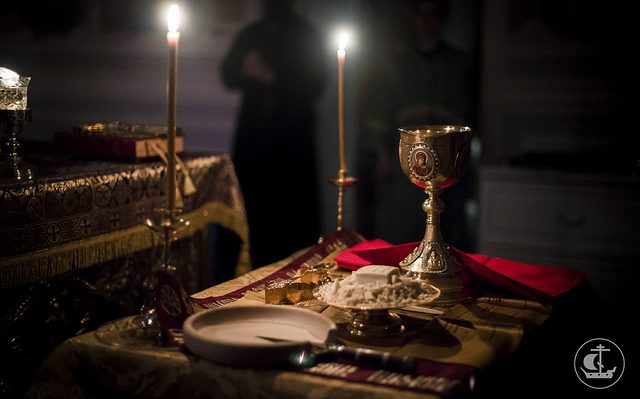A Guest Post by Les Lamkin
“God said it! I believe it! That settles it!”
How many times have I heard that refrain from well-meaning, Bible-believing Christians? Those among that company with some sense of history frequently cry “Sola Scriptura!” along with their aforementioned affirmation.
They are typically the folks who also place great stock in the idea that our doctrines and practices should follow the “plain sense” of scripture.
Accordingly, those same folk dismiss many of the time-honored practices of the church by claiming that they are artificial to Christianity; human inventions that have no place in the beliefs or practices of the church. Yet when pointed to the Old Testament for evidence that even ancient Israel practiced divinely appointed rituals and ceremonies, many of them respond with, “That was the old covenant! We live under the new!”
It seems that the only things God said that we can take as Gospel is, well, the Gospel. Two-thirds of the Bible is regarded as suspect—unless of course it validates our moral or political presuppositions.
The practices that much of Christianity dismisses as artificial ‘traditions of men’ have a Biblical and historical foundation. God instituted rites and ceremonies, not because He needs them, but because we need them.
In his book Imagining the Kingdom, James K. Smith argues that we are surrounded by competing liturgies; the liturgy of the Mall, of Higher Education, of the Sports complex. All these (and many more) compete for our affections. They are pervasive and persuasive. Their liturgies are subtle and draw us into their orbits without resistance, without so much as a whimper. Because they are persuasive, we find our affections directed towards them and away God. Our calendars are marked by secular holidays, with their attendant retail equivalents. Our days follow a secular work-a-day schedule that leaves little or no room for God. Worst of all, our churches have been lured into a commercialized parody of the pop-culture entertainment liturgy, complete with the latest high-tech media, pop star ‘worship leaders’ and a never-ending barrage of FOMO Christian top-forty hits. We rush to learn the new songs and, as soon as they are learned, are forgotten, relegated to the trash heap of yesterday.
The people of God have a liturgy. It may be a deliberate, biblically grounded, historical liturgy, or it may be a contemporary liturgy dictated to us by the commercially oriented pop culture. Every church has a liturgy; yours, mine, Chris Tomlin’s. The question isn’t “do we have a liturgy”, but “which liturgy are we going to use?”
If we want our worship of God to be authentic (I hate that word, but it is, unfortunately, part of our modern nomenclature) then shouldn’t we be consulting God, asking Him what worship should look like?
“But there’s no liturgy in the Bible!”
Ah, but there is! If we truly believe that the Bible is the Word of God, complete and entire, true and faithful in regards to faith and practice, then it’s going to require more than a cursory skimming of Jesus, Paul and John to pull out the foundations of Christian liturgy. Just as most Christians have to dig into scripture and, more than likely, consult the works of Bible scholars (and, horror of horrors, perhaps consult the Creeds and Church Fathers!) to pull out the doctrine of the Trinity, so it is with defining Christian Liturgy. There are no quick and easy Bible references. It requires a comprehensive cover-to-cover examination of the Bible, from creation to the culmination of history.
God instituted ceremonies and sacrifices for worship in Leviticus. The sacrifices typically ended with a “communion” meal involving the worshiper who offered the sacrifice, the priest and any other worshipers present. All the sacrifices described were followed throughout the history of Israel.
David introduced an element of personal lyricism and devotion into worship with the Psalms. The sacrifices continued.
The prophets corrected deviations in worship.
The first Christians, all Jews, continued to worship in the temple, but found in the sacrificial death and resurrection of Jesus the culmination, the fulfillment, of the sacrifices instituted in Leviticus. Jesus himself instituted a new communion meal, the Eucharist.
The church of the first and second centuries continued the practices faithfully. We can find records of their practices in the writings of the early Church Fathers.
For the next several centuries, the worship practices of the Church continued. The Church, as a human institution under the direction of the Holy Spirit, altered and corrected the liturgy as needed.
It wasn’t until 19th century American Revivalism that the church began to question the Biblical, historic liturgy of the church. Stanley Hauerwas’ essay “Worship, Evangelism, Ethics: On Eliminating the ‘And’” offers an excellent insight into American Revivalism and its effect on worship. Finding the essay online is difficult, but it appears Hauerwas’ book A Better Hope.
The situation today is dire. For the sake of “relevance” the church has abandoned the historic practices of the church and turned the worship of the God, the Almighty Creator and Sustainer of the Universe, into a worship of emotion and sensation. The only object and subject of our worship is supposed to be God. We have turned worship into the worship of our psychological selves. We have sacrificed the great Creeds and Confessions of the church for the sake of “meeting the needs” of the congregants. We have sacrificed depth and beauty to the gods of relevance and sensuality.
In the Old Testament, the faithful Kings of Israel and Judah threw down the altars to Baal and the Asherah Poles. No doubt the Hebrew worshipers of Baal, Moloch, Asherah and the myriad of other pagan gods believed their worship to be sincere, correct and beneficial. God thought otherwise.
Don’t take my word for it. Paul commended the Berean church for scouring the scriptures. I can’t imagine that they consulted only whatever Paul, John and the Gospel writers had produced by that time. The Law and the Prophets figured predominately in their study. So dig!
God said it. I do believe it. That does settle it. But I refuse to settle for easy answers, for proof-text theology that seeks justification by quoting isolated verses divorced from the grand scheme of the Bible. I refuse to abandon the wisdom and learning of the Church Fathers in favor pop-culture, pop-theology Christianity.
By the grace of God, I refuse to worship anything or anybody but the God who called us out of darkness and into the light of His love, mercy, grace and beauty.
Photo:
Flickr, creative commons 2.0














